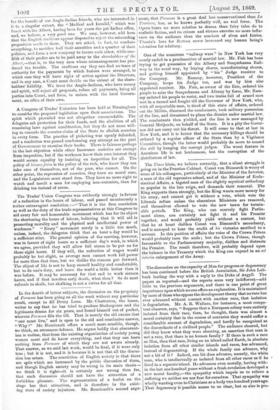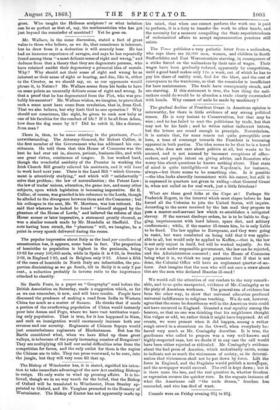The discussion on the capacity of Man for progress or
degeneracy has been continued before the British Association, Sir John Lub- bock leading the way with a reply to the Duke of Argyll. The papers as reported—and the reports seem very indifferent—add little to the previous arguments, and there is one point of great importance upon which no one offers an explanation. It is maintained by most of those who oppose the development theory that no race has ever advanced without contact with another race, that isolation is degradation. Mr. A. R. Wallace, for instance, a most compe- tent observer, says, "Suppose that a European colony were entirely isolated from their race, then, he thought, there was almost a moral certainty that in the course of centuries they would suffer a considerable amount of degradation, and hardly be recognized as the descendants of a civilized people." The audience cheered, but did they know what they were cheering, an assertion that man is not a race, that there is no human family ? If there is such a race as Man, then that race, living on an island called Earth, in absolute isolation from all other similar islands and races, has advanced, instead of degenerating. If the whole family can advance, why not a bit of it? Indeed, one bit does advance, namely, the white man, who is intellectually as isolated from all other races as if he lived in a separate island. He advances even morally, having with- in the last one hundred years without a fresh revelation developed a new moral faculty,—the sympathy which impels us to relieve a suffering we neither see nor fear for ourselves. That sympathy was wholly wanting even to Christians as a body two hundred years ago. That degeneracy in possible seems to us clear, but so also is pro- gress. Who taught the Hellenes sculpture ? or what isolation oan be so perfect as that of, say, the mathematician who has got just beyond the remainder of mankind? Yet he goes on.































 Previous page
Previous page